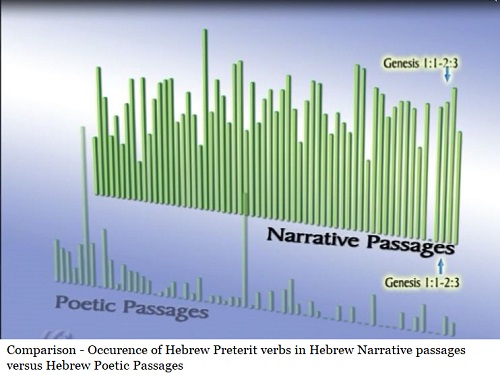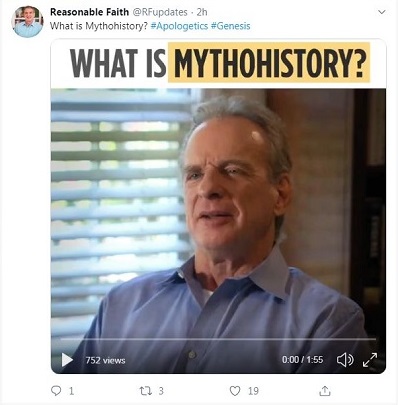|
|
My seminary apologetics teacher Dr. William Lane Craig has a quite serious problem on his hands. He's painted himself into a corner. Dr. Craig has built a career and made and name for himself in apologetics and is well respected in the field. He now faces a problem that could undo all the good work he has done in defending the faith. What problem could possibly be so severe you wonder? Like the man cutting off the branch he's sitting on, Craig is heading in the direction of undermining most if not all the work he has done in defending the existence of God and the resurrection of Jesus Christ. He appears ready to embrace the creation account as "mytho-historical."
Background for the Problem
The problem starts with Craig's premiere argument for the existence of God: The Kalām Cosmological argument. This is because part of his defense is founded on a fairytale, a falsehood that directly contradicts the Bible: The Big Bang theory. I have pointed this out a number of times, most recently in the article Fairytale Apologetics, the Doctrine of Demons and Biblical Inerrancy. For those unfamiliar with Craig's approach, his signature argument for the defense of the existence of God, the Kalām Cosmological argument, is formulated thus:
Premise 1. Whatever begins to exist has a cause.
Premise 2. The universe began to exist.
Conclusion: Therefore the universe has a cause.
Though he typically doesn't mention it, the only cause sufficient to create the universe is God - which he establishes in other arguments. But the real problem is how he supports premise 2 - that the universe began to exist. He uses both unobjectionable philosophical arguments (like the impossibility of traversing an actual infinite), and the objectionable evidence from science that he most unfortunately strongly supports: the Big Bang.
Craig has hitched his wagon so firmly to the Big Bang's magical caravan and its billions of years that he can't help but speak of a young earth understanding of creation without displaying disdain. Consider his remarks on Young Earth Creation when asked about his view of Adam:
"If the Young Earth biblical theology of creation is the correct interpretation, then we face two very difficult choices: either (1) try to defend the scientific viability of a 10-20,000 year old universe, which seems, as I said, hopeless, or else (2) revise one’s doctrine of biblical inspiration and authority so as to allow Scripture to teach error."[1]
and
"I’ve been reading this week the Genesis Commentary by the eminent Old Testament scholar Gerhard von Rad. Again and again von Rad seems to side with the Young Earther that Genesis is to be interpreted scientifically and factually rather than mythically or figuratively. Does he therefore agree with Young Earth Creationism? Of course not! "[2]
So we're to understand that defending a young earth understanding is so "hopeless" we may have to give up inerrancy? (Perish the thought!) And a scholar agreeing with the young earth understanding? That's so absurd in his mind that it warrants an emphatic "of course not!" Clearly Craig has married his apologetics to the big bang theory for so long he can't even seriously consider that the young earth position might be true.
The Problem
So what's the problem with that you ask? The problem for Craig is he's undercutting his own apologetics. On the one hand he wants to defend the miracle of the resurrection of Christ, and he does so by considering the gospel accounts historical narratives; but on the other hand he wants to deny the miracle of the 6 day creation. He has to - because it does not fit with his support of the Big Bang which claims the universe to be 14.7+ billion years old - instead of the approximate 6,000 years the Bible indicates.
In his book The Son Rises - which is a defense of the resurrection of Jesus - which he subtitles "The Historical evidence for the resurrection of Jesus"[3], Craig makes the case that the resurrection of Jesus is the best explanation for the facts of the empty tomb, the resurrection appearances of Jesus (which I cover in AD Apologetics Part 2, Jesus' Triumphant Resurrection), and the origin of the Christian Church. In his chapter on "Blind Allies" (false reasons why philosophers and some people give for disbelieving that the Jesus rose from the dead, most of which I cover in AD Apologetics Part 1 Jesus' death and the Empty Tomb) he lists the "The Legend Theory" promoted by D. F Strauss as the only real threat to the validity of the resurrection. As he puts it:
"This [the legend theory] then is the real issue in contemporary scholarship. The position of the most influential New Testament critic of this century, Rudolf Bultmann, with regard to the resurrection is virtually indistinguishable from that of Strauss. Modern critics who deny the resurrection have followed Strauss in arguing that the resurrection of Jesus is a legend."[4]
So for Craig, the greatest threat to academic (and general) acceptance of the resurrection is the theory that the resurrection is a legend. He spends the rest of the book defending against that proposition. And what's another word for legend? Myth.[5] And where is Craig going with his studies about Adam? Where else can he go? As I said, Craig has painted himself into a corner. He's spent years promoting the Big Bang and it's 14.7+ Billions as a defense for the existence of God. Now when he comes to the account of the creation of Adam - created on the 6th day of creation (Gen 1.26-31) what's an old earther to do? He can't admit the text means what it clearly indicates it means - that would destroy his years of defense of the Kalām argument via the big bang.
So what will Craig do? He has already hinted at where he's going. He will embrace the myth that scripture contains myth:
"For example, if Genesis 1-11 is mytho-historical writing, then a lot of what it says needn’t be taken factually, for it wasn’t intended to be read that way. Adam could be a historical person, but we shouldn’t take the narratives to be factual in every respect (e.g., a talking snake). Paul seemed to regard Adam as a historical person, but, as I shared, even here there is, as you put it, some “wiggle room” for the biblical theologian."[6]
Why does he need "wiggle room"? In order to deny a young creation, and insert his Old Earth secular theories - like the Big Bang of course. His approach is almost certainly to be to understand the genre of the creation narratives in Genesis as "mytho-historical." That is the direction Craig has telegraphed he is moving toward. What is "mytho-historical"? Well first we have to understand "myth" as it is used by theologians. The theological concept of myth was popularized by Rudoph Bultmann who:
"...made a radical dichotomy between the historical Jesus of Nazareth, about whom almost nothing can be known, and the "kerygmatic" Christ of faith, who was preached by the first disciples and, as the product of the early church, was covered with mythology (e.g. Jesus's resurrection and ascension). Accordingly, biblical interpretation demands acknowledging that its preaching and its mythological elements conceal a deeper meaning under the cover of mythology."[7]
So a theological "myth" may be a story that starts with a grain of truth - upon which embellishment upon embellishment is added - and these embellishments are not to be believed - just the grain of truth - which you must find. In Craig's mytho-historical approach the grain of truth is the historical part, and the myth(s) are embellishments meant to convey some spiritual truth. Craig makes clear that not all in a mytho-historical section should be taken as factual or true. As he puts, it, it "needn’t be taken factually, for it wasn’t intended to be read that way." And "we shouldn’t take the narratives to be factual in every respect (e.g., a talking snake)."[8]
So Craig has outlined where he's going. Unless he has an epiphany, he will treat the creation in Genesis the way unbelieving scholars treat the resurrection: he will consider it myth except for the portions which he deems to be true. Of course that won't include the 6 day creation. That's bad news because like the dark side of the force, once Craig starts down the path of denying the truth of the entire bible (John 17.17) it will dominate his approach to his theology. More importantly, as noted above it will undermine his entire apologetic. If the creation is myth, how can he be so sure the resurrection is not also myth? As for the Kalām argument - has he not realized that for secularists, the Big Bang singularity provides the cause his argument says is required. The secularists are not bothered by the fact that the singularity defies the laws of causality and conservation of energy (the first law of thermodynamics). Like the physics-defying theory of cosmic inflation, it's required by the theory so they believe it, no questions asked.
Thus if Craig continues down this road of a "mytho-historical" Genesis, he will have sown the seeds for the unraveling of all his tightly knit arguments.
The Solution
How should we interpret Genesis? How do we interpret any written work? Literary critic E.D. Hirsch Jr. puts it this way:
"An interpreter's notion of the type of meaning he confronts will powerfully influence his understanding of details. This phenomenon will occur at every level of sophistication and is the primary reason for disagreements among qualified interpreters."[9]
Thus if given a written work, if you expect to find fables, you will likely find fables. If you expect parables, you will find parables. If you expect to find history, you will find history. Thus if Craig is intent on saving his big bang apologetic as I believe he is, he is expecting to find in the creation narratives - myth - and will thus interpret the days of creation as myth. That will provide him with the saving mechanism he needs to retain his old earth view which will accommodate his use of the Big Bang theory. Appeals to how it has been traditionally read[10] will no doubt be unconvincing to him since he is no doubt already aware of it. As are (apparently) evidences that the Big Bang Theory is false (see a few reasons why here). Likewise for the sequence of events. Though the Big bang sequence does not match the biblical one (as cosmologist Dr. John Hartnett points out here) that will likely not phase him. In fact as he is influenced by the dark side "mytho-historical" interpretation, he may take such differences as further evidence that Genesis is incorrect. In such a case like secular believers in the big bang, his faith in the big bang fairytale will no doubt remain intact or grow, while his confidence in the inerrancy of scripture wanes.
How Should the Creation Account in Genesis Be Read?
Young Earth Creationists use the historical-grammatical method of interpretation - meaning we understand the meaning within the context it's found in - both historically and literarily. Historically is self explanatory - by literarily I mean history is understood as history, parables as parables, poems as poems, satire as satire, etc. So the question becomes, what type of literature is the creation account in Genesis? It clearly reads as a straight forward historical narrative, which is how it has traditionally been taken, But for those for whom a straight forward reading is not sufficient, Hebrew scholar Dr. Steven Boyd has done extensive word studies on Genesis and other Old Testament passages. His goal: to determine if there is evidence other than a straight forward reading to determine that Genesis is historical narrative. There is. His finding:
What I've done is a statistically rigorous study of the text. Looking at poetic texts versus narrative text, identifying poetic and narrative texts throughout the Hebrew Old Testament and then statistically determining that those types of texts are different based upon certain specific features, regarding types of verbs that occur. And it turns out that the verb distribution, that is the types of verbs, what is called a preterit, that type of verb is distinctive for Hebrew narrative, and marks Hebrew narrative. Now this has been known a long time but not actually established statistically. So it shows that Hebrew narrative, Hebrew prose are distinguished by that particular ratio of preterit to the rest of the finite verbs. The finite verbs are the preterit, the perfects, waw-perfects and imperfects. And so when we take the number of preterites over the total number of finite verbs we find out that ratio is much higher - usually about 40% for narrative versus poetic texts.
...
Having established that... we can to a high level - about 6 figures of statistical validity - we can determine that Genesis 1.1 to 2.3 is a narrative to a 99.9973 percent accuracy. So this is extremely important foundationally to show that Genesis 1.1 to 2.3 is narrative not poetry. You get a young earth if you read the text in a straight forward way and understand it to be narrative.[11]

Conclusion
So there is clear literary and scientifically significant statistical evidence that the creation narrative in Genesis is historical narrative, not myth, not legend. But you don't need to do a statistical analysis to come to that conclusion. You need merely read the text. It reads as straight forward history. The question for Craig is simple: Will he drop the double standard he has been using - accepting the supernatural in the resurrection narratives, while denying it in the creation narrative? Will he stop taking the secular, anti-supernatural approach to the creation account which denies the clear intent of scripture, and accept the meaning as it is clearly intended? Or will he attempt to salvage the secular fairytale to leave it intact in his apologetics and kiss inerrancy goodbye? If he adopts the "mytho-history" approach, we know he has opted for the latter.
For Craig like many, the teaching of a young earth is like the teaching Jesus gave to his disciples when he claimed to be the manna from heaven (John 6.58). As Jesus' disciples put it: "This is a hard teaching." (John 6.60). For many, the young earth is a hard teaching. But what was Jesus' response to his disciples? Did he try to persuade them? No he simply reminded them of who he is - God - the second person of the trinity - who came down from heaven to be with man, who would soon be returning to heaven. (John 6.62) As God has said elsewhere, Is anything too hard for the LORD? (Gen 18.14, Jer 32.27) Once you accept that God created the heavens and the earth, (Gen 1.1) is it really too hard to believe that he did it in 6 days?
Update November 22, 2019
Dr. Craig was kind enough to define "mythohistory" in his own words in the below video. He references old testament scholars who believe in it, but doesn't indicate whether they believe in the inerrancy of scripture. More importantly it remains to be seen if Dr. Craig will crash his belief in biblical inerrancy on the rocks of "mythohistory" in order to retain his ill-held belief in the big bang and an old earth; or will he embrace what the biblical text clearly indicates and formulate an apologetic based on the fact that Genesis clearly teaches that the earth - indeed the entire universe -was created in 6 days.
Duane Caldwell | November 18, 2019
Follow @rationalupdates
Notes
1. William Lane Craig, Q
& A "#588 The Historical Adam", Reasonable Faith, July 22, 2018,
https://www.reasonablefaith.org/writings/question-answer/the-historical-adam/
Back
2. Craig, Q&A "#588 The
Historical Adam"
Back
3. William Lane Craig,
The Son Rises, The Historical Case for the resurrection of Jesus,
Chicago: Moody Press, 1981
Back
4. Craig, The Son
Rises, p.43
Back
5. Webster,
definition c. of legend: "a popular myth of recent origin."
Merriam Webster's New Collegiate Dictionary, Springfield, MA: G&C
Merriam Company, 1973 p 656
Back
6. Craig, Q&A "#588 The
Historical Adam"
Back
7. Gregg R.
Allison, The Baker Compact Dictionary of Theological Terms, Grand
Rapids, MI: Baker Books, 2017, Kindle Edition, Loc 878
Back
8. Craig, Q&A "#588 The
Historical Adam"
Back
9. E.D. Hirsh Jr.,
Validity in Interpretation, New Haven and London: Yale University
Press, 1967
p. 75
Back
10. For evidence that
the Judeo-Christian understanding of the creation origin account has
already been that of a 6 day creation see footnotes
6, 7 and 8 in
Are Young Earth Evidences Needed to Defend Christian Faith
Back
11. Steven Boyd, Ref
from, Thousands...Not Billions, ICR documentary DVD, 2005
Back
Images
Featured:
Sawing the branch you're sitting on ©
Photoschmidt
| Dreamstime used by permission
Comparison Preterit in Hebrew Narrative vs Poetry,
Thousands, Not Billions

